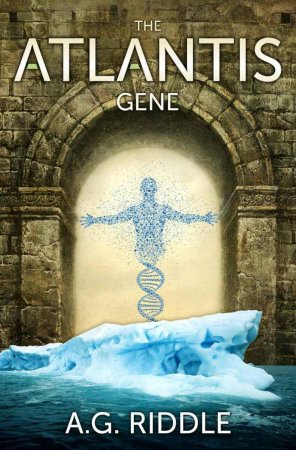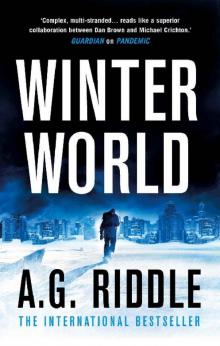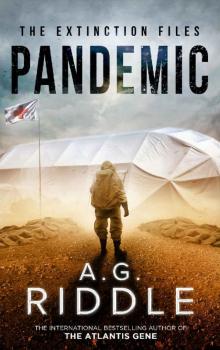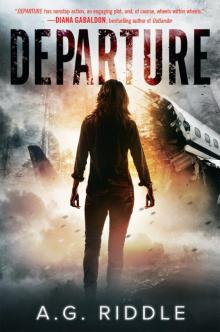- Home
- A. G. Riddle
Departure
Departure Read online
Dedication
For those stubborn enough to dream
Contents
Dedication
Part One: Survivors Chapter One: Harper
Chapter Two: Nick
Chapter Three: Nick
Chapter Four: Harper
Chapter Five: Harper
Chapter Six: Nick
Chapter Seven: Nick
Chapter Eight: Harper
Chapter Nine: Harper
Chapter Ten: Nick
Chapter Eleven: Nick
Chapter Twelve: Harper
Chapter Thirteen: Harper
Chapter Fourteen: Harper
Chapter Fifteen: Nick
Chapter Sixteen: Nick
Chapter Seventeen: Nick
Part Two: Titans Chapter Eighteen: Harper
Chapter Nineteen: Harper
Chapter Twenty: Harper
Chapter Twenty-One: Harper
Chapter Twenty-Two: Harper
Chapter Twenty-Three: Nick
Chapter Twenty-Four: Nick
Chapter Twenty-Five: Nick
Chapter Twenty-Six: Nick
Chapter Twenty-Seven: Nick
Chapter Twenty-Eight: Harper
Chapter Twenty-Nine: Nick
Chapter Thirty: Nick
Chapter Thirty-One: Harper
Chapter Thirty-Two: Harper
Chapter Thirty-Three: Harper
Chapter Thirty-Four: Harper
Chapter Thirty-Five: Nick
Chapter Thirty-Six: Nick
Chapter Thirty-Seven: Harper
Chapter Thirty-Eight: Nick
Chapter Thirty-Nine: Harper
Chapter Forty: Nick
Chapter Forty-One: Nick
Part Three: Strangers Chapter Forty-Two: Harper
Chapter Forty-Three: Nick
Chapter Forty-Four: Harper
Chapter Forty-Five: Nick
Chapter Forty-Six: Harper
Chapter Forty-Seven: Nick
Chapter Forty-Eight: Nick
Chapter Forty-Nine: Nick
Chapter Fifty: Nick
Chapter Fifty-One: Harper
Chapter Fifty-Two: Harper
Chapter Fifty-Three: Harper
Author’s Note
Acknowledgments
About the Author
Also by A.G. Riddle
Credits
Copyright
About the Publisher
PART ONE
SURVIVORS
CHAPTER ONE
Harper
IN ONE HOUR, THIS PLANE WILL LAND, AND I’ll be forced to make the Decision, a call that I may regret for the rest of my earthly existence. Depending on how it goes, chaos and poverty may follow. Or pure bliss. Fifty-fifty odds, I’d say. Not dreading it all. Barely even thinking about the Decision most seconds.
Like most writers, I don’t get out much. Or get paid much. I fly economy, and nine times out of ten I’m sandwiched between a feverish person who coughs when I least expect it and a married man who inevitably asks, “So how’s a cute little thing like you still single?” I suspect the airlines have a flag in their system for me: “Not a complainer, reassign to misery row.”
Not this flight.
Approximately six hours ago I entered a magical world, a place that only exists for brief periods of time forty thousand feet above Earth’s surface: first class on an international flight. This joyous land that pops into and out of existence like an alternative universe has its own strange customs and rituals. I’ve taken it all in, knowing that this will likely be my last glimpse. The ticket probably cost two months’ rent at my microscopic flat in London. I would have rather had the cash, but the ticket was a gift, or, more precisely, an attempt at manipulation by the billionaire who presented the Decision at our meeting in New York.
Which I’m not thinking about right now. Yes, at present, I exist in a Decision-free zone.
The flight time from New York to London is just under seven hours. Every fifteen minutes I switch the screen to check where the plane is, willing it to just keep going, to fly until we run out of fuel. Maybe I’ll slip the flight attendant a note: “Drop below 40,000 feet and it blows!”
“Hey, who do I have to kill to get a refill here? And what’s the deal with the Internet?”
Trouble in paradise. As far as I can tell, there are only two unhappy inhabitants of First Class, Pop. 10. I call this pocket of unrest the Aisle of Brooding and Snide Remarks. Its thirtysomething residents have been waging a drinking and sarcasm contest since takeoff. I know one of them, the individual currently pressing his drink request, and I know what’s eating him because I’m involved in it. His name is Grayson Shaw, and I’ve made every effort to avoid him.
“Hey, I’m talking to you,” Grayson yells.
A thin, dark-haired flight attendant whose name tag reads JILLIAN pokes her head out of the galley and smiles weakly. “Sir, the captain has turned on the Fasten Seat Belts sign and suspended drink—”
“For God’s sake, just throw me two mini bottles. We’re like eight feet apart.”
“Ignore him, Jillian,” the other brooder says. “Two mini bottles won’t fix his problem.”
“Thanks, random guy in 2A. Really insightful.”
Grayson jumps up as another wave of turbulence rocks the plane. I feel him pulling on the back of my headrest as he wades forward. His long blond hair falls around his face, hiding me from his view, and I’m glad for that. He stops in front of my first-row seat, at the entrance to the galley.
“Okay, it’s not that hard. You’re a cocktail waitress in the sky. Now hand me the bottles.”
Jillian’s put-on smile recedes. She reaches for something, but the plane phone rings, and she grabs it instead.
Grayson massages his temple and turns to the side. His eyes meet mine. “You. Jesus, this flight keeps getting worse.”
He’s about to launch into me, but the other brooder is here now, standing uncomfortably close to Grayson. He’s quite handsome, his dark hair short, his face lean, his eyes unflinching.
Grayson stares at him for a second, then cocks his head. “Can I help you?”
“Actually, I came up here to help you.”
Normally I don’t go in for this sort of macho stuff . . . but I have to say, I like the hero from 2A. There’s at once something mysterious and familiar about him.
Grayson opens his mouth to respond, but he never gets a chance. The boom behind us is deafening. The plane drops, stabilizes, then bounces and shakes, like a tiny pebble on the ground during an earthquake. Time seems to stretch out. The two men are on the floor in front of me, rolling around, maybe fighting; the plane is jostling me so hard I can’t tell.
Chaos erupts. The flight attendants fight their way down the aisles, bracing themselves on seat backs, stowing articles when they can, shouting at people to get back in their seats and fasten their seat belts. A voice comes over the PA, but I can’t make out the words.
Compartments overhead pop open, and an oxygen mask dangles in front of me, a round, yellow plastic bowl with a flat bottom. It bounces up and down on the clear plastic tube like a dangling piñata, just out of reach.
Grayson is gone—to where, I don’t know and don’t care. The other brooder gets up and steadies himself on the bulkhead. He peers down the length of the plane, squinting slightly, his eyes moving left and right, seeming to calculate something.
Finally he plops down in the seat beside me and pulls the seat belt tight.
“Hi.”
“Hi,” I mouth, not sure if my voice is audible over the ruckus around us.
“Can you hear me?”
For some reason, his voice is crystal clear. His accent is American, its calmness a sharp contrast to the pandemonium around us. We seem to b
e in a bubble, he and I, talking casually while the outside world disintegrates.
“Yes,” I say, finally hearing my own voice, as if from far away.
“Buckle up and put your head between your knees. Wrap your fingers around the back of your head. Don’t look up.”
“Why?”
“I think we’re about to crash.”
CHAPTER TWO
Nick
I’M ALIVE, BUT I’VE BEEN BETTER.
Every inch of my body aches. Gone is the slight buzz of alcohol, replaced by a pounding headache. It hurts worst around my pelvis. I pulled the belt low right before impact, hoping to spare my internal organs. It worked, but not without cost. I start to unbuckle it, but stop.
It’s too quiet.
The lights are out, and only faint moonlight seeps in through the windows. I hear a few low moans behind me. This 777 held around 250 people when it took off from JFK. If even a fraction were alive, the cabin would be awash in voices, probably screams. The relative silence is a bad sign.
My mind seems clear, my arms are fine, and I think I can walk. I’m in decent shape, but given how rough the crash was, I bet a lot of the other passengers weren’t as lucky as me. I have to help them. For the first time since—well, since I can remember—I feel close to normal, filled with purpose and urgency. I feel alive.
The woman beside me still hasn’t moved. She’s hunched over, her head between her legs, hands clasped behind it as I instructed her.
“Hey.” My voice comes out raspy.
She doesn’t move.
I reach out and brush her blond hair back. She turns slightly, a single bloodshot eye peering up at me, and pushes up slowly, revealing her slender face. The other eye is equally bloodshot. A bruise runs from her temple to her jaw.
“You okay?”
She nods and swallows. “Yeah, I think so.”
What next? Check her mental status? “What’s your name?”
“Harper. Harper Lane.”
“What’s your date of birth, Harper?”
“Eleventh December.” She smiles slightly, not adding the year.
Yeah, she’s okay. She looks late twenties or early thirties to me, and she’s British; I hadn’t realized that before. Probably on her way home to London.
“Stay here—I’ll be right back.”
Now the test. I unfasten my belt, stand up, and immediately stumble into the wall, hitting my shoulder hard. The plane’s settled at about a thirty-degree angle, nose down, tilted slightly to the left. I lean against the bulkhead, waiting for the pain to ebb.
Turning my head, I get my first glimpse back down the aisle . . . and freeze in shock.
The plane’s gone. Almost all of it. The first-class and business-class cabins are all that’s left. Just beyond the business section, tree branches crisscross the ragged opening. Around the edges, electrical pops flash against the dark forest. The vast majority of the passengers were in economy, and there’s no sign of it—only a quiet forest. The rest of the plane could be a hundred miles away, for all I know. Or in a million pieces. I’m surprised we’re not.
On the other side of the wall, I can hear a rhythmic pounding. Staggering a little, I feel my way around the divider that separates first class from the galley. It’s Jillian, the flight attendant, banging on the cockpit door.
“They won’t come out,” she says when she sees me.
Before I can respond, she moves back to the wall, grabs the phone, listens for a second, then tosses it aside. “Dead.”
I think she’s in shock. What’s the priority at this point? I glance back at the sparks popping against the twisted metal. “Jillian, is there a danger of fire?”
“Fire?”
“Yes. Is there any fuel in this section?” It seems like a reasonable question, but who knows?
Jillian gazes past me, confused. “Shouldn’t be a fire. Captain dumped the fuel. Or I thought . . .”
A middle-aged man in first class lifts his head. “Fire?”
People around him begin repeating the word quietly.
“Where are we?” That seems like the next logical question.
Jillian just stares, but Harper says, “We were over England.” When my eyes meet hers, she adds, “I was . . . watching the flight display on the monitor.”
That’s the first bit of good news, but I don’t get to think about it long. The word fire has finally reached the wrong person.
“There’s a fire! We need to get off!” someone yells. Across the plane, people start scrambling out of their seats. A panicked mass of about twenty people coalesces in the cramped space. Several passengers break away and rush to the jagged opening at the rear but turn back, afraid to jump. “We’re trapped!” is added to the cries of “Fire!” and things start to get ugly. A white-haired woman in business class loses her footing and falls. People trample her on their way to the front, where Jillian and I stand speechless. The woman’s screams don’t slow the crowd.
They rush on, directly toward us.
CHAPTER THREE
Nick
THE SURGING CROWD FORCES JILLIAN TO FOCUS. SHE spreads her arms, but her voice fails her. I can barely hear it over the crowd. Her standing there, defenseless in front of the crowd, jolts me into action.
I move forward, push Jillian behind me, and plant my feet. I shout, my own voice ringing out louder and clearer than I expect. “Stop! People, stop moving, you’re hurting that woman! Listen: There. Is. No. Fire.” I say each word more slowly and quietly than the last, infusing the crowd with calm. “Okay? No fire. No danger. Relax.”
Save for a few shoves, the crowd settles. All eyes focus on me.
“Where are we?” a woman yells.
“England.”
The word ripples through the crowd in hushed tones, as if it were a secret.
Jillian moves from behind me and steadies herself on a chair.
All at once, the survivors begin hurling questions at me, like the press corps in the final seconds of a White House briefing.
“Help is on the way,” I find myself saying. “Right now, the key is to stay calm. If you panic, people will get hurt, and if you’re responsible for harming other passengers, you will face criminal charges.” I pause and then add for good measure, “The media’s going to find out who caused trouble after the crash, so you can also expect to be on the morning news.” The threat of public humiliation—most people’s greatest fear—seems to do the trick. The uproar subsides, replaced by suspicious sidelong glances, as people wonder if their neighbors will rat them out for bum-rushing the exit.
“If you’re in pain, stay where you are. If you have internal injuries, moving is the worst thing you can do. Emergency personnel will check you out when they arrive, and they’ll decide when and how to move you.” Sounds good, anyway.
“Where’s the captain?” an overweight middle-aged man asks.
Luckily (or unluckily), the lies keep coming: “He’s coordinating with emergency personnel right now.”
Jillian gives me a confused look. She seems to be trying to decide whether this is good news or a lie. I wonder how much help she’s going to be.
“Who are you?” another passenger yells.
“He’s just a passenger, same as the rest of us.” Looks like the drunken jerk in 2D survived, unfortunately. He stares at me with glassy eyes. “Ignore this clown.”
I shrug. “Of course I’m a passenger—what else would I be? Now listen up. Anyone who can walk, we’re going to leave the aircraft in an orderly fashion. Take the nearest seat, everyone, and wait to be called. This young lady”—I nod to Jillian—“is going to open the emergency exit, and when she calls your row, do what she says. If there’s a doctor on board, come see me immediately.”
Jillian opens the left exit door at the front of the plane, and I hear the evacuation slide inflating. I stand beside her and look out. The slide snags on the trees around us, but it will get people to the ground, six or seven feet below us. The plane’s nose is still a
few feet off the ground. This entire section is being held up by trees, but it feels stable enough.
“What now?” Jillian asks, her voice low.
“Start taking people from the back off first.” I figure that will minimize the plane’s shifting.
Five minutes later a line’s forming at the slide, and the picture becomes clearer. It looks as if everyone in first class survived, but a lot of folks in business—perhaps half of the twenty or so—aren’t moving.
A woman with shoulder-length black hair, maybe in her early forties, pauses at the threshold next to me. “You asked for a doctor?” She has a slight accent—German, I think.
“Yes.”
“I . . . have an M.D., but I’m not a practicing physician.”
“Yeah, well, you are today.”
“All right,” she says, still hesitant.
“Jillian here is going to give you a first-aid kit. I want you to survey the remaining passengers and prioritize treatment. Anyone in immediate danger first, then children, then women, then men.”
Without a word, the doctor starts making her way through the cabin, Jillian at her side. I man the exit, making sure that people are spaced out enough to get down the slide without colliding. Finally I watch the last passenger make her way down: the elderly woman who was almost trampled. Her feet touch the ground, and an older man, possibly her husband, catches her hand and helps her up. He nods to me slowly, and I nod back.
From the galley between first and business classes, I hear the clink of glass bottles and an angry voice: 2D berating someone.
I step back there to find Harper standing across from 2D, her face pained. He’s got a dozen mini bottles lined up on the slanted table. Half are empty, and 2D’s unscrewing the cap on a Tanqueray.
I’d like to get into what he said or did to her, but there are more pressing matters—namely the remainder of the passengers, many of whom might need help and possibly medical treatment.
“Stop drinking those,” I snap. “We may need them for medical care.” We could run out of antiseptic before help arrives, and liquor would be better than nothing.

 The Atlantis Gene: A Thriller
The Atlantis Gene: A Thriller The Solar War (The Long Winter Book 2)
The Solar War (The Long Winter Book 2) The Extinction Files Box Set
The Extinction Files Box Set The Atlantis Trilogy Box Set- The Complete Series
The Atlantis Trilogy Box Set- The Complete Series Winter World
Winter World Genome
Genome Pandemic (The Extinction Files Book 1)
Pandemic (The Extinction Files Book 1) The Atlantis Gene: A Thriller (The Origin Mystery, Book 1)
The Atlantis Gene: A Thriller (The Origin Mystery, Book 1) Departure
Departure Genome (The Extinction Files Book 2)
Genome (The Extinction Files Book 2) The Atlantis World (The Origin Mystery, Book 3)
The Atlantis World (The Origin Mystery, Book 3) The Atlantis Plague: A Thriller (The Origin Mystery, Book 2)
The Atlantis Plague: A Thriller (The Origin Mystery, Book 2)